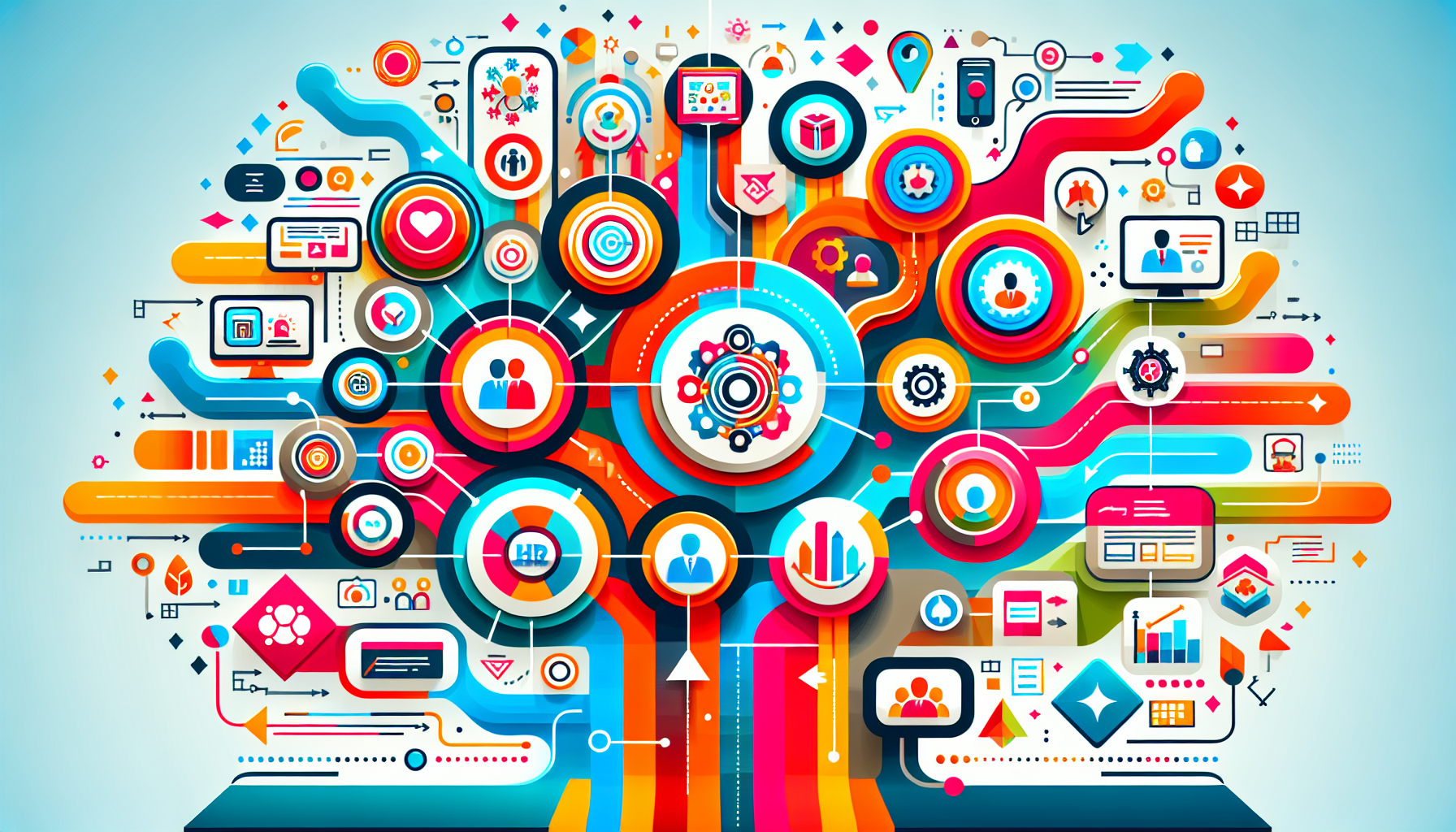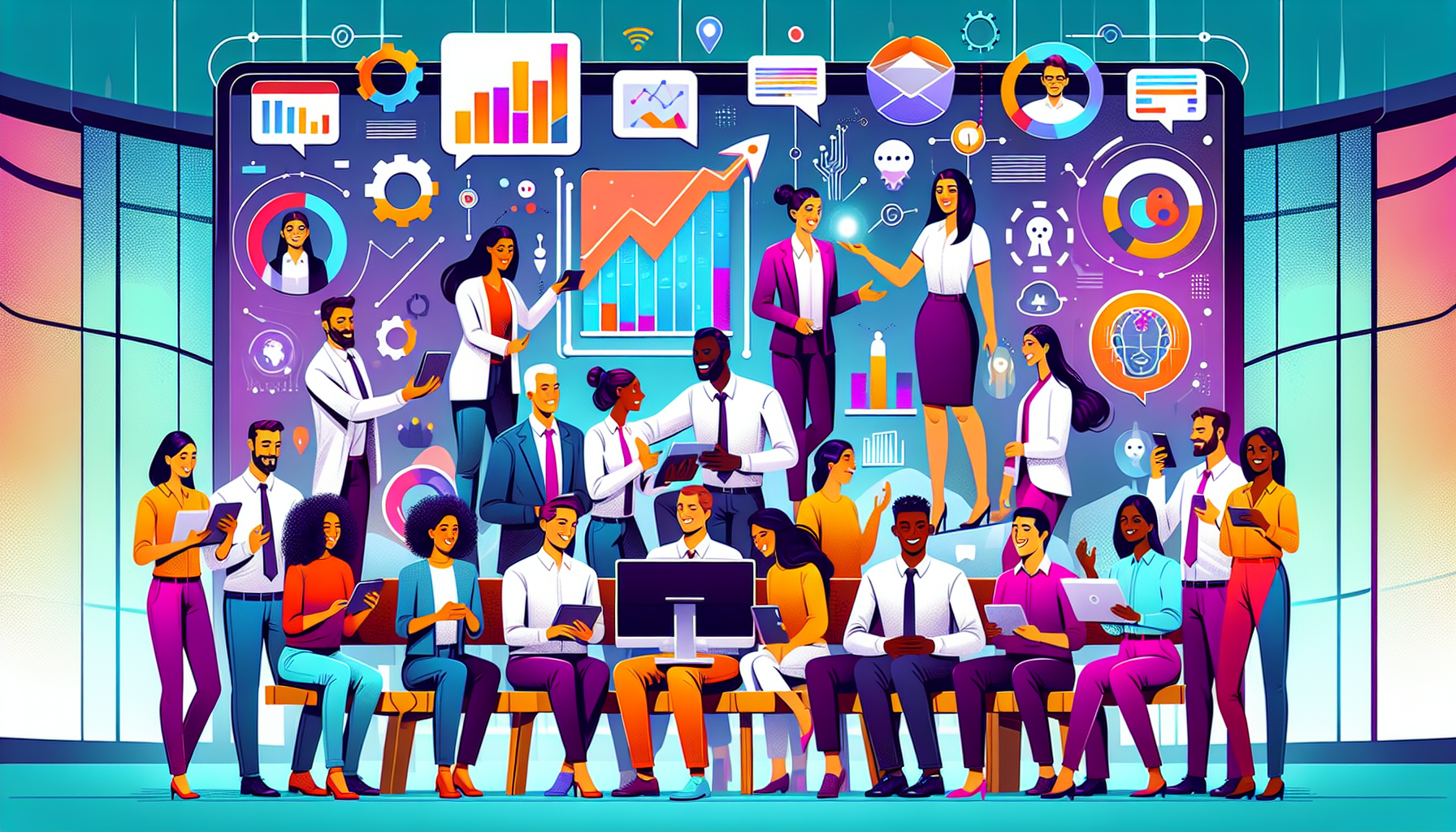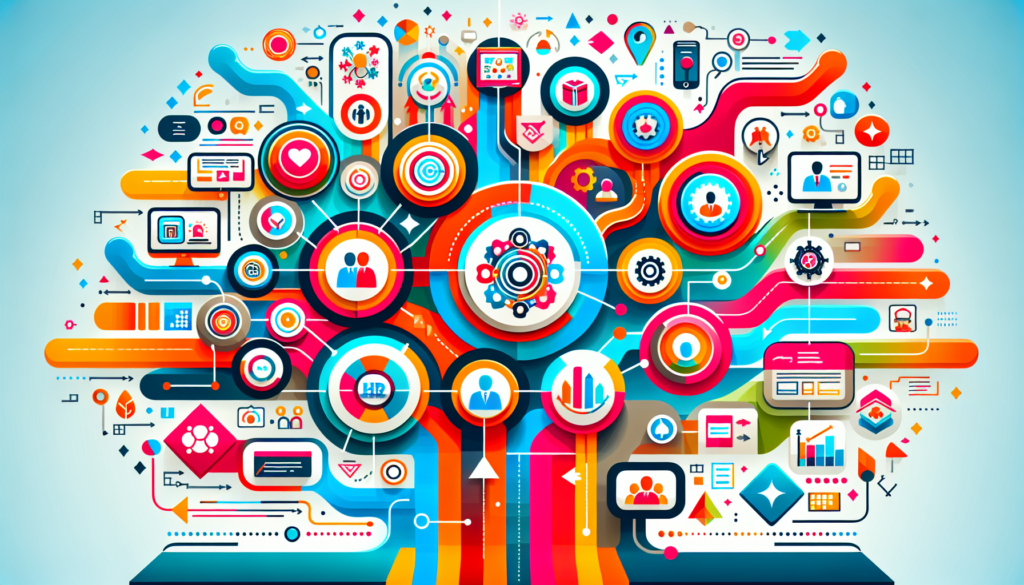Are you looking to streamline your HR processes? HR tech solutions can help automate tasks like payroll, recruitment, and performance management while boosting employee satisfaction. This article covers the top HR tech solutions for 2024 and how they can benefit your organization.
Key Takeaways
- HR tech solutions have evolved to enhance efficiency in HR operations and improve employee satisfaction through automation and user-friendly features.
- In 2024, key HR tech solutions include all-in-one HR software, specialized HR tools, and innovative AI-driven technologies that address specific organizational needs.
- Choosing the right HR tech solution requires assessing business needs, user experience, integration capabilities, and budget considerations to align with strategic objectives.
Understanding HR Tech Solutions

HR technology, often referred to as Human Resource Management Software (HRMS), has come a long way from its early days of limited functionality. Today, it encompasses a wide range of tools designed to assist with daily HR management tasks, from recruitment and payroll processing to performance management and employee engagement. This evolution has transformed HR into a strategic function that plays a crucial role in driving organizational success.
Organizations that employ HR tech solutions significantly enhance their ability to recruit and nurture talent, boosting overall performance and competitiveness. The benefits of these technologies are manifold, including improved efficiency in HR operations, better data management, enhanced compliance, and streamlined administrative tasks. Automating routine HR tasks allows companies to free up their HR teams for strategic initiatives, such as talent management and employee development.
The current HRMS market reflects a growing importance and adoption of digital solutions that improve communication and collaboration within organizations. As businesses continue to recognize the value of these technologies, the demand for comprehensive and user-friendly HR software solutions is on the rise. This shift towards digital transformation is driven by the need to stay competitive in a rapidly changing business environment.
HR tech solutions also play a pivotal role in enhancing the overall employee experience. Self-service features and mobile accessibility empower employees to manage tasks like updating personal details, requesting time off, and accessing benefits information. This not only improves employee satisfaction but also reduces the administrative burden on HR teams.
Understanding today’s HR tech solutions is crucial for organizations aiming to enhance HR processes and boost employee satisfaction. Whether it’s through comprehensive HR software, specialized HR tools, or innovative AI-driven technologies, the right HR tech solution can make a significant difference in achieving your business goals.
Top HR Tech Solutions for 2024

The HR software market is broad and segmented, offering a variety of solutions to meet the diverse needs of HR teams. These solutions can be categorized into Human Resource Information Systems (HRIS), Human Resource Management Systems (HRMS), and Human Capital Management (HCM). Each category serves different functions, from basic employee record-keeping to comprehensive management of all HR activities.
In 2024, several HR tech solutions stand out for their ability to enhance HR processes and improve employee experience. These solutions include:
- All-in-one HR software
- Specialized HR tools for specific tasks
- Innovative AI-driven technologies that bring advanced analytics and automation to the forefront
Understanding the strengths and features of each solution helps HR leaders make informed decisions that align with their needs and strategic goals.
All-in-one HR software solutions are designed to unify multiple HR functions into a single platform, providing a comprehensive approach to HR management. These platforms are ideal for organizations looking to streamline their HR operations and reduce the complexity of managing multiple systems.
On the other hand, specialized HR tools focus on specific HR tasks, such as performance management or employee engagement, offering targeted solutions that can be integrated into a broader HR strategy.
Innovative AI-driven HR technologies are increasingly becoming a game-changer in the HR software market. These tools leverage artificial intelligence to automate routine tasks, provide data-driven insights, and enhance decision-making processes. As AI continues to evolve, its integration into HR tech solutions is expected to bring even more advanced capabilities, transforming the way HR departments operate.
Best all-in-one HR software
All-in-one HR software solutions provide a unified platform that consolidates various HR functions, including administration, recruitment, payroll, employee engagement, and performance management. These comprehensive tools are particularly beneficial for organizations seeking to streamline their HR processes and improve efficiency.
One of the leading all-in-one HR software solutions is BambooHR, which is highly recommended for first-time HR software users. BambooHR efficiently manages basic HR needs such as payroll, benefits administration, time tracking, and recruiting, making it a cost-effective solution for small to midsize businesses. Its user-friendly interface and flexible pricing model make it an attractive option for companies looking to enhance their HR operations without significant upfront investment. Additionally, it is often considered among the best hr software options available.
Rippling is another notable all-in-one HR software that caters to midsize businesses. It offers extensive customization options, allowing organizations to tailor workflows and approval processes to their specific needs. Rippling’s comprehensive features and positive overall reviews make it a suitable choice for businesses seeking a robust HR software solution.
For larger organizations with more complex HR needs, SAP SuccessFactors stands out as a powerful HR software solution. It provides advanced tools for workforce planning and management, helping HR teams to effectively manage their human capital. SAP SuccessFactors is known for its customizable features, which can be tailored to meet the specific requirements of any organization.
Finally, Deel offers a flexible and free-to-use model that is ideal for organizations of any size. Its platform integrates services for international hiring and payroll, ensuring efficient HR process management across different geographies. This flexibility makes Deel a versatile option for companies looking to manage their HR functions on a global scale.
Specialized HR tools
Specialized HR tools focus on specific HR tasks, providing targeted solutions that enhance efficiency and effectiveness in particular areas of HR management. These tools are essential for organizations that require advanced capabilities beyond what all-in-one HR software can offer.
Performance management software is a prime example of a specialized HR tool that helps organizations track and improve employee performance effectively. By providing real-time feedback and performance evaluations, these tools enable HR teams to identify areas for improvement and implement targeted development plans. This not only enhances employee performance but also contributes to overall organizational success.
Employee engagement management software is another specialized tool designed to enhance employee satisfaction and retention. These tools foster communication and feedback within the organization, helping to create a positive work environment. By actively involving employees in the feedback process, organizations can address concerns promptly and improve employee morale.
The integration of specialized HR tools leads to better HR efficiency and increased employee satisfaction through targeted management of individual HR functions. For instance, talent management tools can streamline the hiring process by automating candidate assessments and providing data-driven insights into candidate suitability. Similarly, workforce planning tools can help HR teams anticipate staffing needs and allocate resources more effectively.
In summary, specialized HR tools play a crucial role in enhancing specific HR processes. By focusing on particular areas such as performance management, employee engagement, and talent management, these tools provide targeted solutions that can be integrated into a broader HR strategy. This approach allows organizations to address their unique HR needs more effectively and achieve better outcomes.
Innovative AI-driven HR technologies
Innovative AI-driven HR technologies are revolutionizing the HR software market by automating routine tasks, providing advanced analytics, and enhancing decision-making processes. These technologies leverage artificial intelligence to streamline various HR functions, from talent acquisition to employee development.
One of the key benefits of AI-driven HR software is its ability to automate the talent acquisition process. By sourcing candidates, ranking applicants, and scoring job fit, AI tools significantly improve hiring efficiency and accuracy. This automation allows HR teams to focus on more strategic activities, such as building relationships with top candidates and refining recruitment strategies.
AI-driven recruitment management software can also predict hiring needs and identify suitable candidates based on vacancy requirements. These capabilities enable organizations to stay ahead of their hiring needs and ensure a steady pipeline of qualified candidates. Additionally, AI tools can provide personalized learning recommendations tailored to employee needs, enhancing employee development opportunities.
In 2024, generative AI is expected to be integrated into HR technology solutions beyond isolated use cases. This integration will enhance workflows and user experiences, making AI-driven HR software even more powerful and versatile. For example, generative AI can assist in creating personalized training programs, optimizing workforce planning, and providing real-time insights into employee performance.
Overall, the integration of AI into HR technologies is transforming the way HR departments operate. By automating routine tasks, providing data-driven insights, and enhancing decision-making processes, AI-driven HR software helps organizations improve efficiency, boost employee satisfaction, and achieve better business outcomes.
Choosing the Right HR Tech Solution for Your Business
Choosing the right HR tech solution is crucial for any business looking to enhance its HR processes and align them with its overall business strategy. Several factors must be considered, including the size of the business, budget constraints, daily HR processes, and long-term company goals. By carefully assessing these factors, organizations can select an HR software solution that best meets their unique needs.
One of the first decisions to make is whether to opt for a custom HRMS development or an out-of-the-box solution. Custom solutions offer the advantage of being tailored to specific business requirements, but they can be more expensive and time-consuming to develop. On the other hand, out-of-the-box solutions are ready to use and often come with a range of customizable features.
Upgrading an existing HRMS solution is also an option to consider when the old system is no longer sufficient to meet the organization’s needs. This might involve evaluating user experience, integration capabilities, and the overall technical fit of the new HR technology. Ensuring that the new solution is user-friendly and integrates seamlessly with existing systems is critical for successful implementation and adoption.
Effective HR technology management involves managing the transformation process to deliver business value. This includes considering relevant experience, technology stack, service rates, and customer testimonials when choosing a tech partner for HR software development. By evaluating these factors, businesses can make informed decisions and select the right HR tech solution to support their strategic objectives.
Assessing business needs and goals
Aligning HR technology with the overall business strategy is essential for enhancing HR efficiency and effectiveness. Before selecting an HR software solution, it’s important to understand the specific functions and features needed to support the business’s strategic objectives. This involves a thorough assessment of the organization’s HR processes, challenges, and goals.
Predictive analytics plays a significant role in workforce planning and talent management. By utilizing external labor market data, organizations can make informed decisions about staffing needs, talent acquisition, and employee development. AI-driven tools can further enhance the talent acquisition process, leading to faster recruitment and improved employee retention rates.
Understanding the specific business needs and aligning them with the capabilities of HR technology ensures that the chosen solution delivers maximum value. This strategic approach helps organizations optimize their HR processes, improve efficiency, and achieve better business outcomes.
Evaluating user experience and integration
User experience is a critical factor in the successful implementation of HR technology. Employees expect HR tools to enhance their experiences and meet their needs effectively. A significant challenge during the implementation of new HR technology is user resistance, which can impede successful adoption. Therefore, it’s essential to select a solution with an easy-to-use interface that offers seamless integration with existing systems.
Effective integration relies on thorough planning, especially when coordinating integrations with payroll solutions. Key criteria for ensuring the technical fit of HR technology include viability, ease of implementation, integration capabilities, IT architecture fit, security, and privacy considerations. Involving UI/UX designers and business analysts in the development process can help create an effective user interface that accommodates users with varying levels of experience.
Learning management systems support the tracking of employee development and foster a culture of continuous education. By prioritizing user experience and ensuring seamless integration, organizations can enhance employee engagement, satisfaction, and overall performance.
Budget considerations
Budget considerations are crucial when selecting an HR tech solution. Companies should allocate approximately 10% of their budget for innovative HR technology investments. This investment can significantly enhance HR processes and deliver long-term value to the organization.
Different pricing models, including tiered plans and flat fees, should be evaluated to find the most cost-effective option that meets the business’s needs. For instance, the Essentials plan with a payroll add-on is a cost-effective option for businesses with fewer than 40 employees using the TriNet HR Platform. This approach allows organizations to balance cost with functionality, ensuring they get the best return on their investment.
Effective budget management is crucial for organizations to balance cost with functionality when selecting HR technology solutions. By carefully considering budget constraints and evaluating different pricing models, businesses can make informed decisions and select the right HR tech solution to support their strategic objectives.
How HR Tech Solutions Improve HR Processes

The implementation of HR tech solutions can significantly improve HR processes, enhancing efficiency and employee satisfaction. By centralizing employee information and automating routine tasks, HR teams can focus on more strategic initiatives. This shift not only improves productivity but also fosters a more engaged and satisfied workforce.
Many organizations report increased efficiency and reduced administrative tasks after adopting HR tech solutions. These technologies facilitate data-driven decision-making, enabling HR professionals to analyze workforce trends and improve organizational strategies. Automation within HR technology decreases human error and administrative burdens, allowing HR to drive higher productivity.
HR software provides built-in compliance warnings, tracking paperwork, and access to best practices documents. This ensures that organizations adhere to HR laws and regulations, reducing the risk of non-compliance and associated penalties. Moreover, self-service features empower employees to manage their own information, fostering a sense of ownership and reducing the HR workload.
Overall, the adoption of HR tech solutions leads to significant improvements in operational efficiency and employee satisfaction. By automating routine tasks, enhancing employee engagement, and streamlining payroll and benefits administration, these technologies help organizations achieve better business outcomes.
Automating routine HR tasks
Automation in HR significantly reduces manual data entry, allowing HR professionals to focus on more strategic roles. By automating routine tasks such as recruitment and payroll processing, organizations can achieve significant time savings and improve overall efficiency.
A small business that implemented an integrated HR software solution reported better compliance and efficiency by automating various administrative tasks. This not only saved time but also ensured that HR processes were more accurate and consistent.
The future of HR technology is expected to focus on integrating more artificial intelligence features, further enhancing decision-making and automation in human resources.
In summary, automating routine HR tasks through advanced HR technology allows organizations to reduce manual errors, improve compliance, and free up HR teams to focus on strategic initiatives. This leads to higher productivity and better overall performance.
Enhancing employee engagement and satisfaction
Mobile HR applications are becoming essential as they allow employees to perform HR-related tasks conveniently from their devices. These solutions enable greater flexibility and engagement, allowing employees to access HR services anywhere and anytime. This is particularly important for deskless workers who need to access essential HR functions from their smartphones.
ADP Workforce Now is an example of a solution that improves the employee experience by providing access to self-service features like time off requests and benefits decision tools. Such features empower employees to manage their own HR-related tasks, leading to greater satisfaction and reduced administrative burden on HR teams and enhancing workforce management.
Emerging HR technologies will increasingly focus on enhancing the employee experience while promoting efficiency within HR processes. By leveraging mobile solutions and self-service features, organizations can boost employee satisfaction and engagement, leading to better overall performance.
Streamlining payroll and benefits administration
Advanced payroll solutions can automate tax calculations and benefit management, leading to increased accuracy and efficiency in payroll processing. These systems not only simplify payroll processing but also ensure precise management of employee benefits, reducing the risk of errors and compliance issues with payroll software.
A small business that integrated an HR software solution reported enhanced compliance with labor regulations and streamlined employee onboarding processes. This integration also reduced the administrative workload significantly, allowing HR teams to focus on more strategic tasks.
By streamlining payroll and benefits administration through advanced HR technology, organizations can enhance efficiency, reduce manual errors, and ensure compliance with regulatory requirements. This leads to improved operational performance and greater employee satisfaction.
Case Studies: Successful Implementations of HR Tech Solutions

Real-world case studies provide valuable insights into the transformative impact of HR tech solutions on various organizations. By examining successful implementations, businesses can better understand how these technologies can enhance their HR processes and achieve better outcomes.
One notable example is a small business that enhanced its efficiency and compliance through the use of an integrated HR software solution. Another case study involves a large organization that leveraged AI-driven HR technologies to improve talent acquisition and employee development. Additionally, a non-profit organization used specialized HR tools to enhance its volunteer management and streamline HR processes.
These case studies illustrate the diverse applications and benefits of HR tech solutions across different types of organizations. Learning from these examples allows businesses to make informed decisions about implementing HR technology to support their strategic goals.
Small business success story
HR software plays a pivotal role in enhancing organizational efficiency and ensuring compliance with regulations, especially for small businesses. One small business implemented an integrated HR software solution that included features like payroll processing, performance management, and employee record maintenance.
Following the implementation of the integrated HR software, the small business reported a significant decline in compliance issues and a boost in operational efficiency. This allowed the HR team to focus on more strategic initiatives, such as employee development and talent management.
By adopting an integrated HR software solution, small businesses can achieve better compliance, improved efficiency, and enhanced employee satisfaction. This ultimately leads to better overall performance and growth.
Large enterprise case study
Large enterprises are increasingly leveraging AI-driven technologies to enhance their talent acquisition processes, allowing for more data-driven recruitment strategies. Advanced AI tools can analyze vast amounts of candidate data, helping HR teams identify the best-suited candidates faster and with greater accuracy.
AI technologies also support employee training by providing tailored learning experiences based on individual performance and career aspirations. This personalized approach ensures that employees receive the training and development they need to succeed in their roles.
The integration of AI in HR processes significantly boosts efficiency, ensuring that both talent acquisition and employee development are optimized for better employee satisfaction. By leveraging AI-driven HR technologies, large enterprises can achieve better business outcomes and maintain a competitive edge.
Non-profit organization example
A non-profit organization implemented specialized HR tools that significantly improved its volunteer management system and optimized HR workflows. These tools facilitated better tracking and engagement of volunteers, ensuring that the organization could effectively manage its volunteer workforce.
By streamlining its volunteer management and HR processes, the non-profit organization achieved better volunteer engagement and operational efficiency. The adoption of these specialized HR tools also enhanced the overall efficiency of the HR processes within the organization.
Through the use of specialized HR tools, non-profit organizations can improve their HR processes, enhance volunteer engagement, and achieve better operational performance. This ultimately supports the organization’s mission and goals.
Future Trends in HR Technology

As we look to the future, several emerging trends in HR technology are set to transform the way HR processes are managed. Companies are increasingly allocating a significant portion of their budget to investments in innovative hr technology strategy, recognizing the long-term benefits these tools can provide.
HR technology leaders are also increasing their spending on reporting and analytics platforms, which provide valuable insights into workforce metrics and trends. This shift towards data-driven HR management is driven by the need to make informed decisions that align with dynamic workforce demands and organizational goals.
Mobile platforms are becoming increasingly important, enabling real-time access to HR functions and enhancing employee self-service capabilities. Additionally, predictive analytics is being leveraged to improve talent management strategies and optimize resource allocation.
Finally, the integration of blockchain technology into HR processes ensures secure and transparent transactions, enhancing trust and efficiency in HR management. These trends highlight the ongoing evolution of HR technology and its potential to drive significant improvements in HR processes and business outcomes.
The rise of mobile HR solutions
Mobile HR solutions are becoming increasingly important due to the rise of a digital-native workforce. These solutions are driven by the expectation of seamless experiences from employees who are accustomed to using mobile devices for various tasks.
Mobile HR solutions enhance employee self-service capabilities, enabling staff to manage HR tasks efficiently from their devices. This includes functionalities such as payroll processing, performance reviews, and benefits management, all accessible from a smartphone or tablet.
The move towards mobile accessibility in HR solutions suggests a significant evolution in how human resource management will function in the future. Adopting mobile HR solutions provides a more flexible and engaging experience for employees, boosting satisfaction and productivity.
Advances in predictive analytics
Predictive analytics in HR refers to the use of statistical methods to analyze current and historical data to forecast future outcomes, especially in talent management. Leveraging predictive analytics enhances talent management strategies through improved candidate selection, employee retention predictions, and tailored training programs.
Predictive analytics can significantly improve workforce planning by allowing HR departments to anticipate staffing needs, manage talent pipelines, and optimize resource allocation based on projected trends. This data-driven approach ensures that organizations are better prepared to meet their workforce demands and achieve their strategic goals.
The integration of predictive analytics in HR practices will continue to evolve, enabling businesses to make more informed decisions that align with dynamic workforce demands and organizational goals. As predictive analytics tools become more advanced, their impact on HR management will only increase, providing deeper insights and more accurate forecasts.
Integration of blockchain in HR
Blockchain technology ensures that HR transactions are secure and transparent, ultimately enhancing trust in HR processes. One significant application of blockchain in HR is the verification of employee credentials and qualifications, streamlining recruitment processes.
Another application involves payroll processing, where blockchain can provide a decentralized ledger for real-time tracking of transactions, reducing errors and fraud. Blockchain can also be utilized for managing employee benefits by ensuring accurate records of employee contributions and entitlements.
Through its immutable ledger, blockchain technology creates a transparent audit trail for HR transactions, enhancing accountability and compliance. The integration of blockchain into HR is not just about efficiency but also about fostering a more secure and trustworthy environment for all stakeholders.
Summary
In conclusion, HR tech solutions play a crucial role in modernizing HR processes and enhancing employee satisfaction. By adopting comprehensive HR software, specialized HR tools, and innovative AI-driven technologies, organizations can significantly improve their operational efficiency and overall performance.
Choosing the right HR tech solution involves careful consideration of business needs, user experience, integration capabilities, and budget constraints. By aligning HR technology with strategic business objectives, organizations can ensure that they get the maximum value from their investment and achieve better business outcomes.
As we look to the future, emerging trends such as mobile HR solutions, predictive analytics, and blockchain integration will continue to transform the HR landscape. By staying ahead of these trends and adopting innovative HR technologies, organizations can create a more efficient, engaging, and secure work environment for their employees.
Frequently Asked Questions
What are the main categories of HR software?
The main categories of HR software include Human Resource Information Systems (HRIS), Human Resource Management Systems (HRMS), and Human Capital Management (HCM). Understanding these categories can help organizations select the right tools for their HR needs.
How can AI-driven HR technologies improve the hiring process?
AI-driven HR technologies enhance the hiring process by automating candidate assessments and efficiently sourcing and ranking applicants, which leads to improved accuracy and effectiveness in identifying the best job fit.
What factors should be considered when selecting an HR tech solution?
When selecting an HR tech solution, it is essential to consider business size, budget, daily HR processes, company goals, user experience, integration capabilities, and technical fit. These factors will ensure the solution aligns with your organizational needs and objectives.
How do mobile HR solutions enhance employee engagement?
Mobile HR solutions significantly enhance employee engagement by offering self-service capabilities, enabling employees to efficiently manage HR tasks through their devices, which fosters greater flexibility and overall job satisfaction.
What are the benefits of integrating blockchain technology into HR processes?
Integrating blockchain technology into HR processes enhances trust and efficiency by ensuring secure and transparent transactions, verifying employee credentials, streamlining payroll processing, and maintaining accurate records of employee contributions and entitlements. This clarity and security can significantly improve the overall management of human resources.
About InTech Ideas
If you’re looking to elevate your tech strategy and drive business growth, InTech Ideas is here to help. We offer a comprehensive suite of services, including Software Development Teams, Product Development Fast Track, and Product Leadership & Advisory. Whether you need to scale your development team, fast-track your product, or bring in expert leadership, we provide tailored, people-first solutions that align with your company’s goals. Learn more about how we can support your journey by exploring our services or contacting us today to discuss your specific needs.

